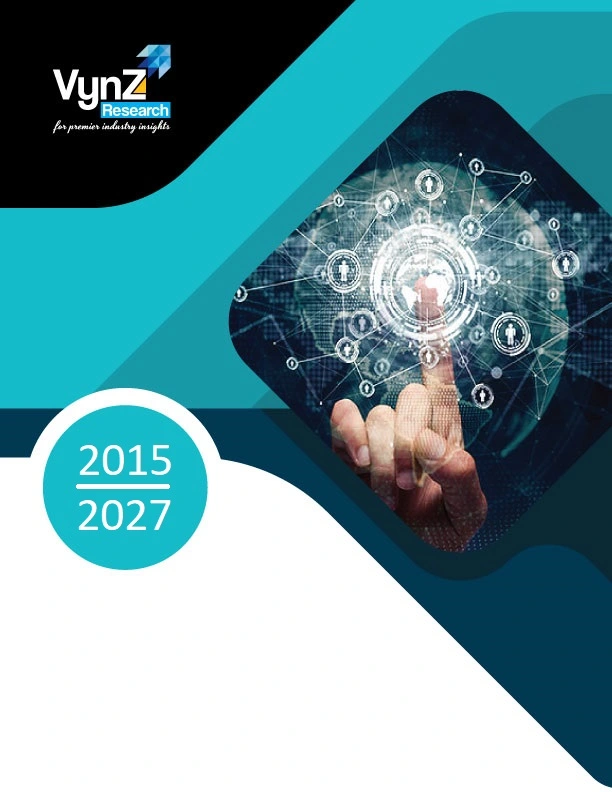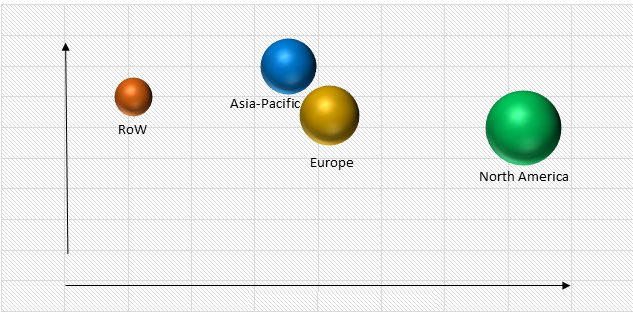| Status : Published | Published On : Mar, 2024 | Report Code : VRICT5006 | Industry : ICT & Media | Available Format :

|
Page : 139 |

Global Artificial Intelligence (AI) in Cyber Security Market – Analysis and Forecast (2025-2030)
Industry Insights by Technology (Natural Language Processing, Speech Recognition, Machine Learning, and Image Processing), by Service Type (Identity and Access Security Services, Network Security Services, Cloud Security Services, Data Security Services, and Others), by Application (Firewall, Distributed Denial of Services, Anomaly Detection, Web filtering, Intrusion Detection, and Data Loss Prevention), by Geography (North America, Europe, Asia-Pacific, Middle East, and Rest of the World)
Industry Overview
The Global AI in Cyber Security Market is estimated to be valued at USD 16.0 billion in 2023 and is expected to reach USD 40.5 billion by 2030, growing at a CAGR of 28.5% during the forecast period (2025–2030).
A wide range of technologies propels the growth of this market, such as machine language and more. The demand and use of these specific technologies have been exceptionally high over the past few years. This is mainly due to increased use and dependence on IoT devices. It is also due to the rise in cyberattacks and the susceptibility of the systems connected through Wi-Fi. These factors will propel the growth of this market during the forecast period.

Market Segmentation
Technology Insights
The AI in the cyber security market has different segments based on different technologies. These include speech or voice recognition, Natural Language Processing (NLP), image processing, and Machine Learning (ML). The market is however dominated by ML technology which helps in different computing tasks including data processing, prediction, analysis, and studying and interpreting consumer behaviors. As a result, machine learning technology is used the most.
Service Type Insights
As per the security types, the Global Artificial Intelligence (AI) in the Cyber Security Market is categorized into network security service type, access and identity security service type, data security service type, cloud security service type, and more. Out of all these, due to its extensive acceptance and use, the cloud security service type is predominant and is expected to continue its rapid growth in the forecast period. Large and small enterprises alike are supposed to use it to meet their ever-rising needs for data storage, server preservation, and minimizing the vulnerability of their systems to cyberattacks.
Application Insights
The market is also categorized on the application perspective. These include firewalls, web filtering, Distributed Denial of Services (DDoS), intrusion identification, anomaly detection, and data loss prevention. Among all these applications, the largest shareholder of the market as of now is anomaly detection. This is mainly due to the rising instances of banking and financial scams, and increased cyberattacks. The banking industry especially has adopted AI as an effective tool for monitoring fraudulent activities and detecting intrusions to preserve cybersecurity.

Industry Dynamics
Market Growth Drivers
In addition to the rising implementation of digital solutions, the strict regulatory guidelines to ensure data privacy have contributed to the growth of this market. For example, CCPA, GDPR, and other data privacy and protection regulations need strong measures to ensure cybersecurity. AI can provide these and ensure regulatory compliance while maintaining and tracking data flows and detecting susceptibilities to ensure sensitive data protection.
There has been a significant increase in the number of cyberattacks worldwide through ransomware and malware. As a result, businesses are now moving from on-site to cloud-based solutions to store data safely, bringing rapid growth in the AI market. This not only preserves servers and resources but also prevents hacking.
AI can handle large volumes of complex data and provide an accurate analysis report in no time. It enhances productivity and efficiency, resulting in market growth. AI has a wide range of functionality. It can identify the pattern of attacks and potential threats, enabling businesses to take proper remedial measures well in advance.
The sophisticated algorithms can also detect suspicious activities or incongruities, all in real-time. This facilitates prompt reaction to cyber threats, actual or potential.Machine learning is a specific technology with advanced techniques for behavioral analysis. This enables businesses to learn about cyber threats and adapt accordingly. It helps to automate cybersecurity tasks, which not only reduces the time to react but also the chances of errors due to no human intervention requirement.
Over the years,there has been widespread adoption of IoT devices and cloud computing. While it eases tasks, it also brings risks of cyberattacks with it. AI solutions ward off cybercriminals and ensure the protection of the cloud environment, networks, and IoT devices connected to a network in real time.
The World Economic Forum (WEF) says that one of the five most significant global events is cyberattacks apart from natural disasters and weather events. It ranks at the top, which increases the need for AI-based solutions to avert data fraud and cyber threats.
Overall, it is the continuous and significant susceptibility of the databases that has contributed significantly to the growth of theGlobal Artificial Intelligence (AI) in the Cyber Security Market.
Global Artificial Intelligence in Cyber Security Market Report Coverage
|
Report Metric |
Details |
|
Historical Period |
2018 - 2023 |
|
Base Year Considered |
2024 |
|
Forecast Period |
2025 - 2030 |
|
Market Size in 2024 |
U.S.D. 16.0 Billion |
|
Revenue Forecast in 2030 |
U.S.D. 40.5 Billion |
|
Growth Rate |
28.5% |
|
Segments Covered in the Report |
By Technology, By Service Type, and By Application |
|
Report Scope |
Market Trends, Drivers, and Restraints; Revenue Estimation and Forecast; Segmentation Analysis; Impact of COVID-19; Companies’ Strategic Developments; Market Share Analysis of Key Players; Company Profiling |
|
Regions Covered in the Report |
North America, Europe, Asia-Pacific, Middle East, and Rest of the World |
Market Restraints
There is a notable limitation in the budgets in underdeveloped and developing countries due to other economic issues. AI is also not fully capable of identifying and handling emerging cyber threats proactively, which also hinders the growth of this market.There is a notable shortage of expert personnel to understand the potential of AI and handle cybersecurity threats, which impedes the growth of this market.
All these factors may affect the growth of the market adversely but continual research and developments are made to mitigate them and facilitate the growth of this market.
Geographic Overview
The AI in the cybersecurity market is dominated by North America. It holds the leading position mainly due to the rise in the use of connected devices and also in the number of malware attacks. In addition, a lot of major players in this industry allocate a significant amount of money to address such threats and ensure effective and proactive cybersecurity.
However, a lot of large and small enterprises in the Asia-Pacific region are now extensively using AI-based technologies and solutions to prevent cyberattacks, contributing to the growth of the market.
Global Artificial Intelligence (AI) in Cyber Security Market, By Region

Key Players Covered in the Report
Key Market players in the AI in cybersecurity industry are Check Point Software Technologies Ltd, Juniper Networks, Inc., Amazon, Inc., Intel Corporation, RSA Security LLC, Palo Alto Networks, Inc., Fortinet, Inc., IBM Corporation, Inc., FireEye, Inc., BAE Systems Plc, Cisco Systems Inc., and Symantec Corporation are some of the key players offering solutions and services for AI in cybersecurity.
Recent Development
Recently, Check Point (CHKP) has introduced its Quantum Force series. There are 10 high-performance firewalls which are address the security needs of enterprise data centers, businesses of all dimensions, network perimeters and campuses. The advanced Check Point Infinity Platform, integrates cloud-based security intelligence and nearly 50 artificial intelligence (AI) engines.
The Quantum Force series offer power efficiency, threat prevention and compact 1RU/2RU form factors for space optimization, which are controlled through unified management for comprehensive security scenarios. There is an incresing need for fast and secured networks now a days. With the hybrid workforce, there is a growing need for secure and fast networks to make the remote work possible.
Juniper Networks, a leader in secure, AI-Native Networking and Quantum security and visionary Quantum Xchange has announced the collaboration to bring quantum-resistant data and communication networks to Managed Service Providers (MSPs), government agencies, and global enterprises.
This agreement shall make easy to deploy, highly compatible and maintain security and quantum-resistant network infrastructure technologies to market which go through increasingly stringent regulatory requirements for secure data and consumer privacy
The Global Artificial Intelligence (AI) in Cyber Security Market report offers a comprehensive market segmentation analysis along with an estimation for the forecast period 2025–2030.
Segments Covered in the Report
- By Technology
- Natural Language Processing
- Speech Recognition
- Machine Learning
- Image Processing
- By Service Type
- Identity and Access Security Services
- Network Security Services
- Cloud Security Services
- Data Security Services
- Others
- By Application
- Firewall
- Distributed Denial of Services
- Anomaly Detection
- Web filtering
- Intrusion Detection
- Data Loss Prevention
Region Covered in the Report
- North America
- U.S.
- Canada
- Mexico
- Europe
- Germany
- U.K.
- France
- Italy
- Spain
- Russia
- Rest of Europe
- Asia-Pacific (APAC)
- China
- Japan
- India
- South Korea
- Rest of Asia-Pacific
- Rest of the World (RoW)
- Brazil
- Saudi Arabia
- South Africa
- U.A.E.
- Other Countries
.png)
Source: VynZ Research
.png)
Source: VynZ Research
Frequently Asked Questions
Purchase Options
Latest Report
Research Methodology
- Desk Research / Pilot Interviews
- Build Market Size Model
- Research and Analysis
- Final Deliverabvle
Connect With Our Sales Team
- Toll-Free: 1 888 253 3960
- Phone: +91 9960 288 381
- Email: enquiry@vynzresearch.com
Artificial Intelligence in Cyber Security Market
